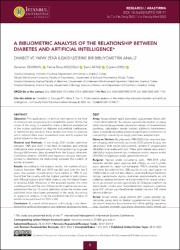| dc.contributor.author | Demirkol, Denizhan | |
| dc.contributor.author | Koçoğlu, Fatma Önay | |
| dc.contributor.author | Aktaş, Şamil | |
| dc.contributor.author | Erol, Çiğdem | |
| dc.date.accessioned | 2022-03-18T12:19:00Z | |
| dc.date.available | 2022-03-18T12:19:00Z | |
| dc.date.issued | 2022 | en_US |
| dc.identifier.citation | Demirkol, Denizhan, and Fatma Önay Koçoğlu and Şamil Aktaş and Çiğdem Erol. 2019. “A BIBLIOMETRIC ANALYSIS OF THE RELATIONSHIP BETWEEN DIABETES AND ARTIFICIAL INTELLIGENCE.” Journal of Istanbul Faculty of Medicine 0, no. 0: -. https://doi.org/10.26650/IUITFD.928111 | en_US |
| dc.identifier.issn | 1305-6441 | |
| dc.identifier.uri | https://doi.org/10.26650/IUITFD.928111 | |
| dc.identifier.uri | https://hdl.handle.net/20.500.12809/9858 | |
| dc.description.abstract | Objective: The applications of artificial intelligence in the field of medicine are progressing at a remarkable speed. Within the scope of this study, it is aimed to make a detailed examination of the studies published on diabetes and artificial intelligence, to determine any trends in these studies over time, to examine which subjects have been researched more and to explain the global interest in the subject.
Material and Methods: In this study, 2534 studies published between 1985 and 2020 in the field of diabetes and artificial intelligence were analyzed using the R programming language through bibliometric data obtained from the Scopus database. Correlation analysis, ANOVA and regression analysis were performed to determine the relationship between the number of articles and years.
Results: According to the analysis results, the number of publications between 1985 and 2015 was 604 and over the last 5 years, the number of publications have tripled to 1930. It was found that the country with the highest number of publications with 358 publications and 10426 citations was the United States of America (USA). Moreover, in the analyzed studies, the most used keywords and the use of these words together was also examined and the top 10 source platforms where the studies were published most have been presented in the study. According to regression analysis, it can be predicted that the number of articles to be published for 2021 is 242.
Conclusion: As a result of the analysis in this study, it was determined that artificial intelligence and diabetes applications have become one of the important global research topics in today's golden age of artificial intelligence, and it was also determined that there is an urgent need for artificial intelligence supported scientific studies to prevent diabetes or diagnose diabetes in the early period. | en_US |
| dc.item-language.iso | eng | en_US |
| dc.publisher | STANBUL UNIV | en_US |
| dc.relation.isversionof | 10.26650/IUITFD.928111 | en_US |
| dc.item-rights | info:eu-repo/semantics/openAccess | en_US |
| dc.subject | Diabetes mellitus | en_US |
| dc.subject | Artificial intelligence | en_US |
| dc.subject | Bibliometric analysis | en_US |
| dc.title | A BIBLIOMETRIC ANALYSIS OF THE RELATIONSHIP BETWEEN DIABETES AND ARTIFICIAL INTELLIGENCE | en_US |
| dc.item-type | article | en_US |
| dc.contributor.department | MÜ, Mühendislik Fakültesi, Yazılım Mühendisliği Bölümü | en_US |
| dc.contributor.authorID | 0000-0002-1096-9865 | en_US |
| dc.contributor.institutionauthor | Koçoğlu, Fatma Önay | |
| dc.relation.journal | JOURNAL OF ISTANBUL FACULTY OF MEDICINE-ISTANBUL TIP FAKULTESI DERGISI | en_US |
| dc.relation.publicationcategory | Makale - Uluslararası Hakemli Dergi - Kurum Öğretim Elemanı | en_US |


















